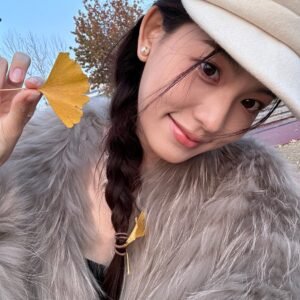In the highly competitive T-shirt market, one attribute is more sought-after than ever: softness. People who value comfortable tees have a challenge: with all the brands, styles, and fabric blends out there, how do you know which is the softest t shirts?
Don’t worry—we’ve got the answers. In this post, we’ll explore the world of short-sleeve comfort and make finding the most comfortable shirts completely effortless, whether you want to sell or wear them.
What’s t-shirt softness?
What is your first requirement for a T-shirt? It is likely that it moves with the body, fits well and is skin-friendly. In other words, you want a soft T-shirt.But have you ever wondered what t-shirt softness actually is?
The Textile Institute defines fabric handle (softness) as the subjective assessment we make based on touch. How soft t-shirts feel will depend on the person, but researchers have been working on ways to measure and describe it. In academic research, softness is defined as the opposite of stiffness or firmness, determined through tests involving bending length or thickness.
How we define soft
T-shirts with good softness can better fit the body curve, reduce friction on the skin, make people feel comfortable and at ease, and are especially suitable for close-fitting wear. In daily activities, soft T-shirts will not cause skin discomfort due to friction, nor will they generate static electricity. People can hardly feel the existence of the clothes when wearing them, as if they are part of the body.
So, when we talk about the softness of a shirt, we’re referring to how it feels against the skin and the tactile experience, which depends on the chosen material.
What Is The Softest T-Shirt Material?
When we talk about the softest T-shirt fabrics, we’re really talking about how fabrics interact with the skin on a sensory level. Softness is more than just a touch, it’s an emotional connection. It’s what makes a garment trust you the moment it touches you.
Choosing the softest T-shirt fabric is about creating a sensory experience. It’s not just about softness, it’s about how softness feels in different contexts: warmth, weight, movement, and memory. Whether you’re creating premium basics or sustainable essentials, the right fabric sets the tone for how the wearer will feel—not just physically, but emotionally.
What type of shirts are the softest?
Here are the top t-shirt fabric options that stand out for their super soft feel:
- 100% Cotton
The classic T-shirt material, made from the natural fibers of cotton plants, specifically cellulose, an insoluble organic compound crucial to plant structure. These fibers are spun into yarn and woven into a material for your favorite t-shirt. - Tri-blend
A combination of three materials, typically cotton, polyester, and rayon, with a ratio of 50% cotton, 25% polyester, and 25% rayon. These shirts are often “heathered,” but there are solid colors available.
The choice between them may come down to aesthetics for some, depending on what t-shirt design ideas you prefer. But let’s explore the special qualities of each material to make sure you find the softest option.
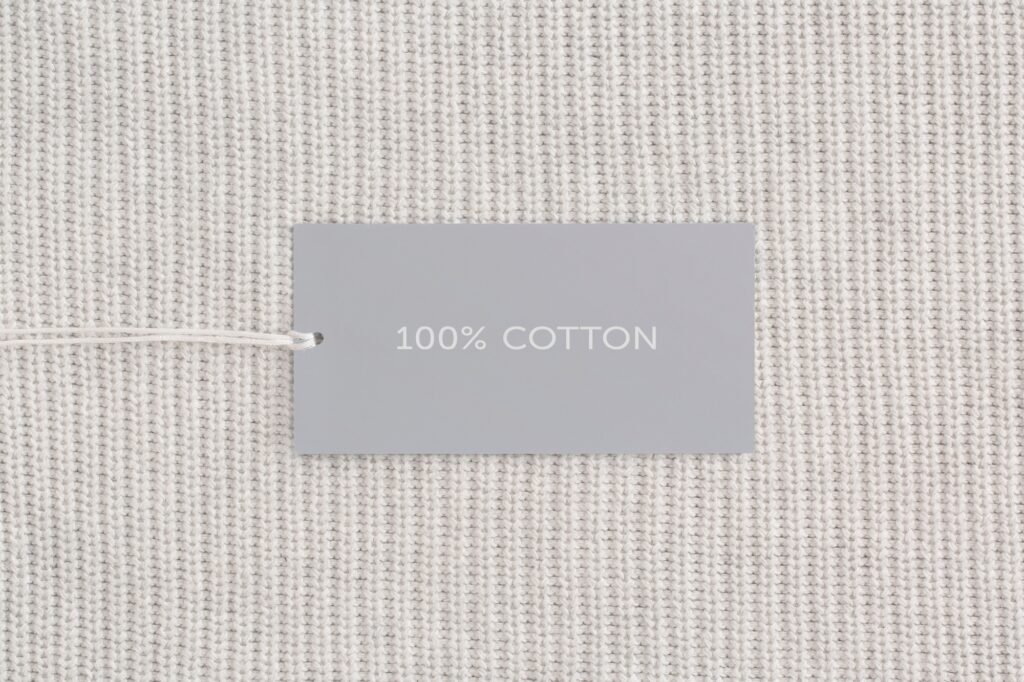
100% Cotton
100% cotton is the best fabric for making T-shirts.We love these shirts because they feel gentle on the skin, use natural fibers, breathe well, and don’t break the bank. Environmentally, 100% cotton is biodegradable, and when organically sourced, it further contributes to sustainable fashion practices.
Here are the most common kinds of cotton you’re likely to come across:
- Combed Cotton
Combed cotton is made by further treating cotton fibers to remove impurities and short strands. This results in a smoother, stronger, and more refined fabric. It offers a softer hand feel and improved durability, making it ideal for premium T-shirts. - Ring-Spun Cotton
Ring-spun cotton is produced by twisting. This produces a finer, stronger, and more elastic yarn. Ring spun cotton is smoother, more durable, and has a more luxurious feel than regular cotton. It is widely used in mid- to high-end fashion and branded goods. - Organic Cotton
Organic cotton is grown without the use of synthetic pesticides, fertilizers, or genetically modified seeds. Certified by certifications such as the Global Organic Textile Standard (GOTS), organic cotton supports environmental sustainability, making it a great choice for eco-conscious brands. Organic cotton is often softer and has a more natural feel. - Pima Cotton / Supima Cotton
These are types of extra-long staple (ELS) cotton, primarily grown in the U.S. (Supima is the trademarked version). They produce finer, smoother, and more durable yarns with exceptional strength and color retention. - Carded Cotton
This is the most basic form of cotton, where fibers are only carded (not combed), resulting in a coarser texture and a less consistent yarn. Carded cotton is more affordable but is more likely to pill or shrink.
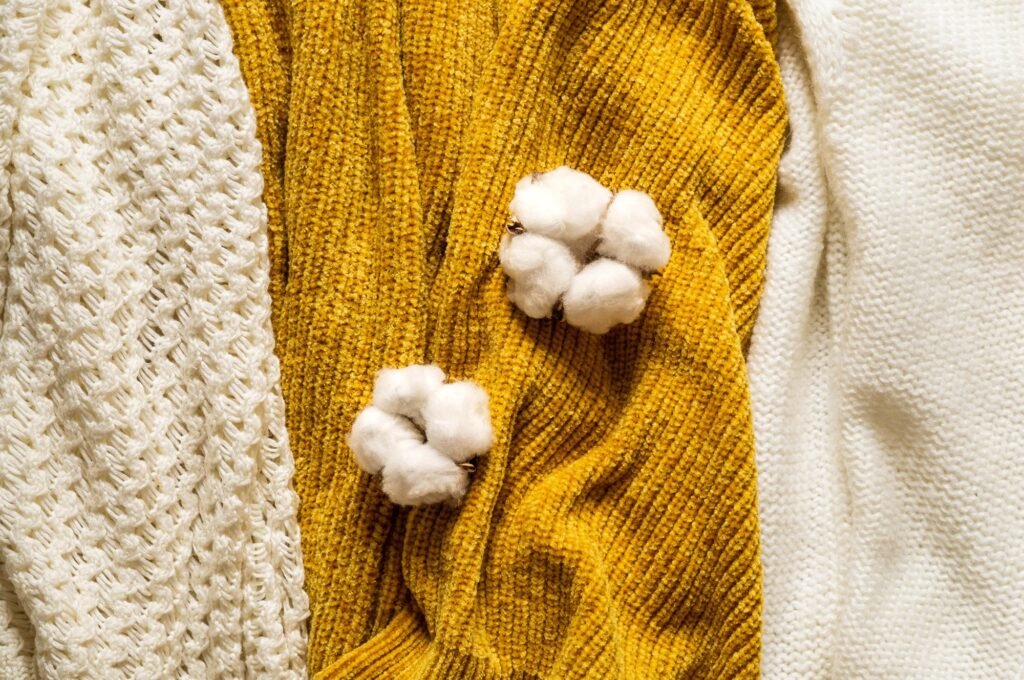
Characteristics of a cotton t-shirt
- Naturally soft: The innate fluffiness and softness of cotton originate from nature itself, although technology and specialized techniques can further boost its softness.
- Light and breathable: Cotton fibers have a hollow structure, allowing air to flow through them effortlessly. This is why, when you wear traditional cotton tees, your skin can breathe.
- Hypoallergenic: Cotton is a non-irritating, biocompatible fiber that is well tolerated by sensitive skin and rarely causes allergic reactions. Cotton is a preferred fabric in medical-grade clothing and infantwear for these reasons. Compared to other types of fabrics, cotton t-shirts are less likely to trigger allergic reactions when you wear them.
- Durable: Although cotton is soft, it has a good balance of tensile strength and abrasion resistance, especially when woven or made into medium- and high-density fabrics.Cotton is strong and tough, so you can trust that your t-shirt will last a long time.
Why are some 100% cotton t-shirts softer than others?
Not all 100% cotton shirts are made alike, even if their composition looks the same on the tag. The exact type, thread count, weave, and weight of the material all play a massive role in the feel of the final garment. Another important factor is, of course, the quality of the Clothing manufacturing.
Here’s what you can keep in mind when choosing your perfect Cotton tee.
- Type: Different types of cotton, such as Supima, Egyptian, or Pima cotton, have longer fibers, making them softer and more durable.
- Thread count: A higher thread count indicates that more threads are woven into each square inch of the garment, so t-shirts with a higher thread count will be softer and smoother.
- Weave: The way the cotton fibers are woven together can affect the texture of the shirt. For example, jersey garments tend to be softer than twill weave items like denim.
- Weight: Lighter-weight garments generally feel softer and more breathable compared to heavyweight options.
- Quality: The quality of manufacturing processes, including spinning, weaving, and finishing, can impact the overall softness and feel of the garment.
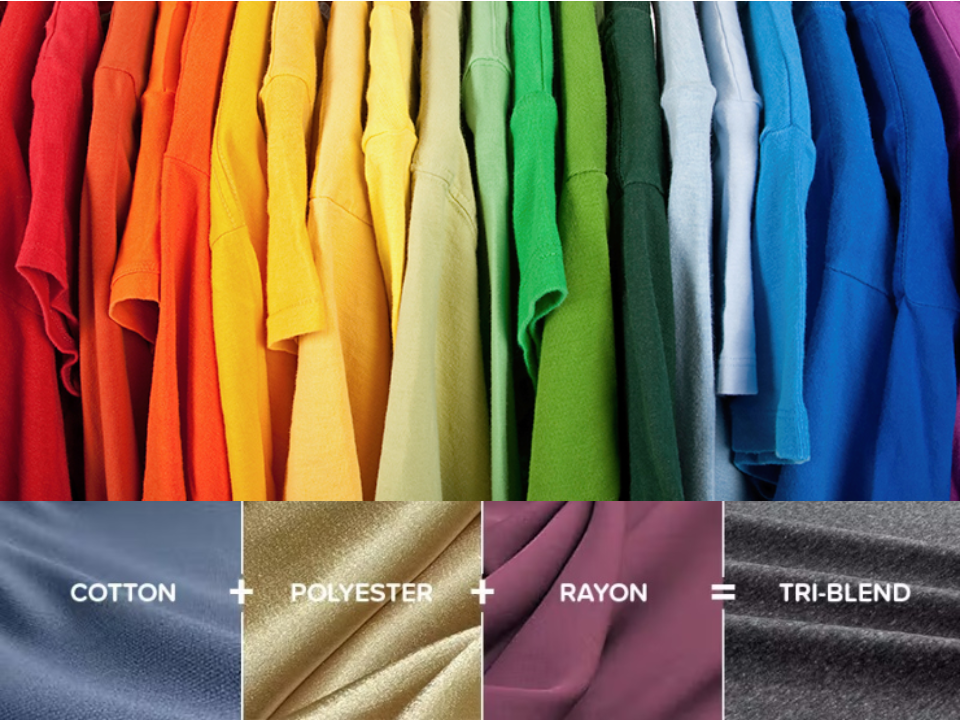
Tri-blend
You might be familiar with the term “tri-blend shirt,” or maybe it’s new to you. Either way, if you want the coziest t-shirts, it’s worth exploring garments made from this blended fabric because it’s a game-changer in the t-shirt industry.
Tri-blend is a knitted fabric made by mixing three different fibers, commonly used in T-shirts, sportswear and fashion casual wear. It combines the advantages of each material and achieves a high balance between comfort, elasticity, durability and visual effects.
The mix of cotton, polyester, and rayon makes for an incredibly soft fabric that feels smooth on the skin and works well for the dyeing process. These t-shirts offer a premium blend of comfort, durability, and breathability, establishing themselves as a prime choice among the best tees for printing.
Rayon is the least common material in this mix. Originally developed as a silk substitute, rayon offers a more silky feel and texture. It’s made of cellulose fibers and absorbs moisture well.
Tri-blends are actually relatively new in the world of t-shirt trends. The fabric emerged in the mid-2000s and gained popularity among those who appreciate soft and lightweight t-shirts.
Characteristics of a tri-blend t-shirt
- Wrinkle-resistant: These t-shirts don’t wrinkle easily and keep their shape well.
- Moisture-absorbing: They combine the moisture-absorbing properties of rayon with the strength and durability of cotton and polyester.
- Lightweight and airy: Blended shirts are ideal for those seeking a light and breezy feel.
- Naturally heathered: This shirt material already comes with a heathered, vintage look. It can depend on the printing technique, design, and colors used.
- Semi-flowy: While not as flowy as silk or viscose, tri-blends offer superior drape and movement compared to cotton or polyester due to the rayon component.
- Comfortable and stretchy: The combination of rayon and polyester imparts a gentle stretch and enhanced softness.

How much does it cost to produce a softest t-shirt?
The production cost of the softest T – shirt varies depending on multiple factors such as the type of fabric, production process, and brand positioning.
- Fabric cost: Fabric is the main factor that determines softness and cost.
For example: Pima & Supima cotton, the cost may be much higher than regular cotton. Assuming that a T-shirt requires about 1 meter of fabric, the fabric cost may be around $5-10. If you use organic cotton or fabrics blended with modal or silk, the cost will be higher. - Accessory Costs: Accessories include collar labels, cuffs, hem threads, buttons (if any), and packaging materials. On average, the trim cost per T-shirt is about $1 to $2.
- Labor Costs: Skilled labor is needed for cutting, sewing, inspecting, and packaging. The labor cost varies by region. In developed countries, it could be relatively high, while in some developing countries, it’s lower. On average, labor costs for each T-shirt may range from $5 to $15.
- Production Overhead: This includes equipment depreciation, rent, utilities, and management costs. This might cost around $1 to $3 per T-shirt.
- Design and branding costs: If the T-shirt has a unique design or custom print, there will be additional design fees. Simple designs may cost an additional $2 to $5 per T-shirt. More complex or branded designs may cost $10 or more.
In summary, the production cost of a very soft T-shirt could range from around $15 for a basic version in a low – cost production area to $50 or more for a high-end, branded T-shirt with premium fabric and complex design in a high-cost region.
How much does it cost to make t-shirts in bulk
In mass production of T-shirts, quantity is the key factor in reducing unit cost. Generally speaking, the larger the order quantity, the lower the cost per T-shirt. This is mainly based on the following reasons:
- Amortizing fixed costs
- There are many fixed costs in the T-shirt production process. Such as the commissioning of production equipment, pattern design costs, order processing costs, and transportation costs. When the order volume is small, these fixed costs are allocated to each T-shirt. The share is larger; as the number of orders increases, the fixed costs are allocated to more T-shirts, and the fixed costs per T-shirt decrease accordingly.
- For example, suppose it costs $500 to design a T-shirt pattern. If the order volume is 100 pieces, the pattern design cost allocated to each T-shirt is $5 (500÷100); if the order volume increases to 1,000 pieces, the pattern design cost per T-shirt drops to $0.5 (500÷1,000).
- Scale effect
- Massive production gives manufacturers more advantages in raw material procurement, production process and manpower utilization.
- For example, the purchase price of cotton fabrics below 100 meters is US$5 per meter. When the purchase volume reaches 1,000 meters, the unit price may drop to US$4 per meter.
- In the production process, the utilization rate of equipment can be improved, thereby reducing the unit production cost.
- In terms of manpower, batch production can arrange the division of labor of workers more reasonably, improve labor efficiency, and reduce the labor cost per unit product.
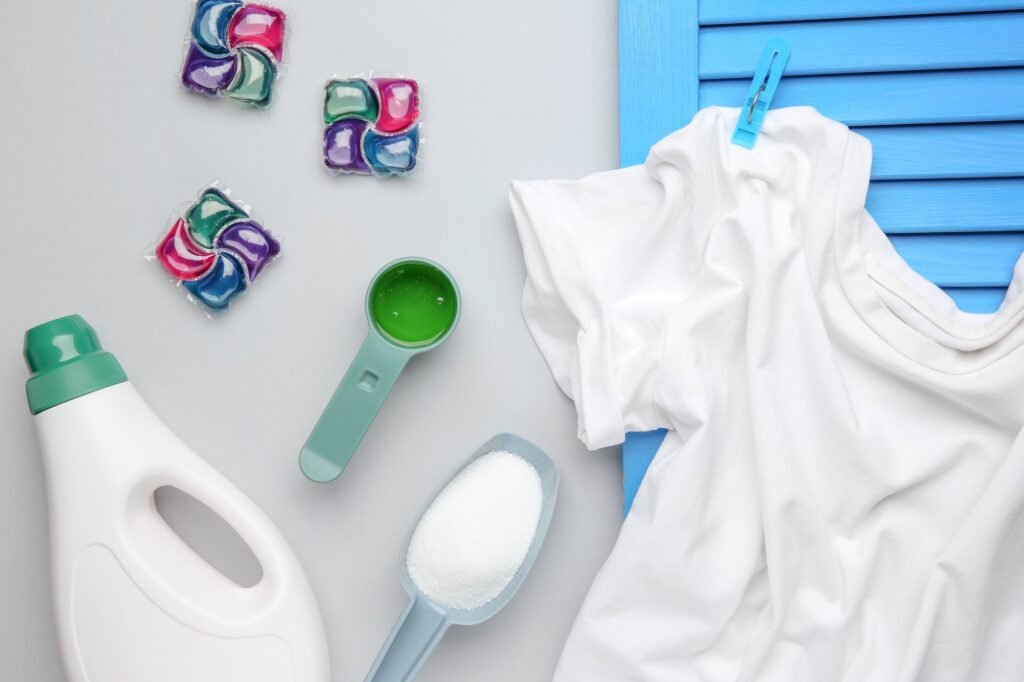
How to Care for and Maintain the softest Quality of T-Shirts?
To care for and maintain the softest quality of T – shirts, you can follow these steps:
- Check the washing label: The washing label on your T-shirt will usually indicate the fabric type, washing temperature, bleaching instructions, ironing temperature, etc. Following these guidelines is essential to maintaining the quality of the garment.
- Sort before washing: Wash dark and light-colored T-shirts separately to prevent fading. Wash easily faded clothes separately to reduce the risk of staining other clothes.
- Choose the right detergent: Use a mild, phosphate-free detergent or liquid laundry detergent. Avoid using products containing bleach or strong alkalinity, as these products can damage fabric fibers.
- Control the water temperature: wash your T-shirt in cold or lukewarm water, no higher than 30°C. Cold water helps preserve the color and shape of your garment.
- Drying Tips: Keep T-shirts out of direct sunlight to prevent fading and hardening. If possible, dry the T-shirt inside out to reduce direct sunlight on the front.
- Storage precautions: Avoid stacking clothes too tightly to avoid wrinkles. Place some desiccant or mothballs in the closet to prevent clothes from getting damp and moldy.
Who makes the softest t shirts
Here are some brands known for making very soft T – shirts:
- Sumkclothing: The best choice for bulk orders of soft T-shirts. Sumkclothing leads the apparel industry with its rich experience in T-shirt manufacturing. Comprehensive T-shirt services can solve every clothing problem of customers. From fabric procurement, production process to labor costs. And bulk orders can be huod free design team. Sumkclothing is very cost-effective.
- Bella+Canvas: Their tri-blend T-shirts, such as the 3413C, are highly praised for their softness. They use innovative manufacturing techniques. In addition, their 3001 C soft cotton T-shirt, which uses combed ring – spun cotton and airlume cotton, has a very soft texture.
- Everlane: It is known for its ethical sourcing and high-quality materials. The brand offers several T – shirts made from Pima cotton, which is a long – staple cotton with longer and finer fibers, resulting in a noticeably softer and smoother feel.
- Sunspel: This is a luxury brand famous for its extremely soft and well-made T-shirts. They often use premium cotton, and the manufacturing process is sophisticated, which makes the T – shirts have a very high-quality feel.
Conclusion
This article will help you clarify the key factors and simplify this critical decision-making process so that you can choose the soft T-shirt that is more suitable for you.
If you are looking for a quality and ethical T-shirt manufacturer, SumkClothing is the place for you. Contact us to work together to make T-shirts softer and take your brand to new heights.

